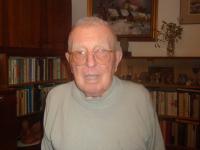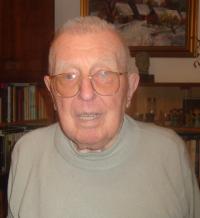The German pharmacist told my father: You’re on the list, I advise you to get out of here!

Download image
Čestmír Císař was born on 2 January 1920 in Hostomice nad Bílinou in northern Bohemia. His father was a self-employed painter and decorator, his mother was mostly at home tending to the family needs. Čestmír was a single child. He attended the grammar school in Duchcov, but in 1936 he received a scholarship to study at a lyceum in the French city of Dijon, where he graduated in 1939. Following the Munich Agreement, the family was forced to abandon their native Hostomice and take refuge in a flat in Prague-Dejvice that the father had rented. The whole family moved in to stay there. Čestmír signed up to the study of social sciences at the Faculty of Arts in Prague in October 1939, but his studies ended abruptly. To compensate for this, he at least joined the sociology club, where his education could continue. He worked as an accountant first in an insurance company, later at a wholesale wine merchant, which saved him from forced labour in Germany. He married in 1944. In the years 1945-8 he completed his studies at the Faculty of Arts. In 1945 he joined the Communist Party of Czechoslovakia (CPC). He held various party offices: an operative and later the head of the Culture and Propaganda Department of the Central Committee of the CPC, secretary of the Regional Committee of the CPC in Pilsen, deputy to the chief editor of Rudé právo (Red Law, the main Czechoslovak daily during Communism), later the chief editor of the magazine Nová mysl (New Mind), in 1963 he briefly held the position of Secretary to the Central Committee of the CPC for Ideology and International Relations. During the years 1963-5 he was the Czechoslovak Minister of Education, he was seen as a liberal and pro-reform politician. In 1965 he was tidied away as Ambassador to Romania. During the Prague Spring he came back into political prominence to lead the Education and Science Department of the Central Committee of the CPC. Students even suggested him as a candidate for presidency after Antonín Novotný ended in office. In July 1968 he became Chairman of the Czech National Council. After the invasion of the Warsaw Pact armies, he was briefly held in custody. At the Vysočany Congress of the Central Committee of the CPC he was elected a member of the Central Committee. In 1969-70 he was a member of the Parliament of Nations of the Federal Assembly. In 1970 he was expelled from the CPC as a supporter of the reformist movement. He lived in seclusion and worked at the Heritage Institute. He returned to his political activities in the late 1980s within the reformist communist movement Obroda (the Renewal Club for Democratic Socialism). He occasionally published in samizdat under the pseudonym Laureatus. After the Velvet Revolution he unsuccessfully attempted to involve Renewal into the new government, he was one of the possible adepts for the presidency, he worked as an advisor to Foreign Minister Jiří Dienstbier and he held the position of Czechoslovak ambassador to the Council of Europe. He died in Prague on 24 March 2013.


